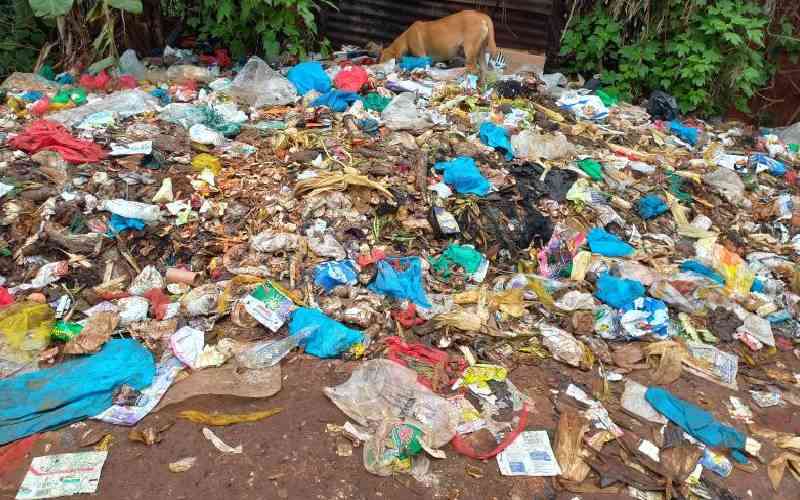
Waste management in Kenya has long been a thorn in the side of environmental sustainability, worsened by rapid population growth and changing lifestyles. The country generates an enormous amount of waste daily, but much of it is left to pile up in uncontrolled dumpsites, waterways, and open spaces, causing untold harm to ecosystems and public health.
Nonetheless, this challenge is not insurmountable—Kenya has the chance to turn the tide by weaving sustainable waste management practices into its economic framework.Each Kenyan generates about half a kilogramme of waste every day, equating to 22,000 tonnes daily or around 8 million tonnes annually. Alarmingly, only 38 per cent of this waste is collected, with less than 10 per cent being recycled. The remainder is either illegally dumped, burnt in the open air, or left to rot in makeshift dumpsites resulting in widespread environmental degradation.
The sorry state of the Nairobi River is a testament to this crisis. Once pristine and teeming with life, it has now been clogged up with plastics and other debris. While the government has rolled out efforts to clean the river, these will likely come to nothing if the broader issues of waste management in the city are not tackled head-on.Urbanisation has also played a significant role in the worsening waste crisis. The volume of waste produced in Kenya’s towns and cities has shot up faster than the rate of development of waste management capacity of these urban setups, leaving the country struggling to keep up with mounting waste.
Several factors have bogged down efforts to establish sustainable waste management systems. Insufficient infrastructure means that waste collection and treatment facilities are few and far between. Public awareness regarding the harmful effects of poor waste management also leaves much to be desired, as many remain unaware of how their actions impact both their health and the environment.
Existing regulations, though well-meaning, are often inadequately enforced, particularly in sectors dealing with hazardous, biomedical, and electronic waste. Moreover, the lack of adequate funding has held back investment in the advanced technologies and systems needed to make a real dent in the problem.
Despite these hurdles, Kenya has a golden opportunity to get a grip on its waste management challenges. Sustainable practices could breathe new life into the economy by creating jobs in waste collection, sorting, and recycling, particularly for informal waste pickers. Proper waste management would also clear up pollution, conserve valuable resources, and improve public health by reducing exposure to hazardous materials.
Economic benefits could flow freely if Kenya embraces the circular economy model, where materials are recycled and reused rather than discarded. This approach would not only cut down on imports of raw materials but also bolster local industries focused on recycling and resource recovery. Organic waste, which accounts for a large proportion of the waste produced, could be converted into energy through technologies such as bio-digestion and pyrolysis. This would not only boost Kenya’s energy mix but also curb greenhouse gas emissions. Furthermore, by recovering valuable materials like plastics, metals, and glass, Kenya could reduce its reliance on imports and shore up its economic resilience.
For Kenya to turn things around, it must step up its efforts on several fronts. Public awareness campaigns are crucial to help citizens wake up to the importance of reducing, reusing, and recycling waste. Encouraging households and businesses to sort their waste at the source would make collection and recycling far more efficient. Regulatory frameworks need tightening, and enforcement must be ramped up, particularly in high-risk sectors. Investing in waste-to-energy technologies could pave the way for turning organic waste into biogas or electricity, providing a win-win solution for waste management and energy production.
 The Standard Group Plc is a multi-media organization with investments in media
platforms spanning newspaper print
operations, television, radio broadcasting, digital and online services. The
Standard Group is recognized as a
leading multi-media house in Kenya with a key influence in matters of national and
international interest.
The Standard Group Plc is a multi-media organization with investments in media
platforms spanning newspaper print
operations, television, radio broadcasting, digital and online services. The
Standard Group is recognized as a
leading multi-media house in Kenya with a key influence in matters of national and
international interest.



